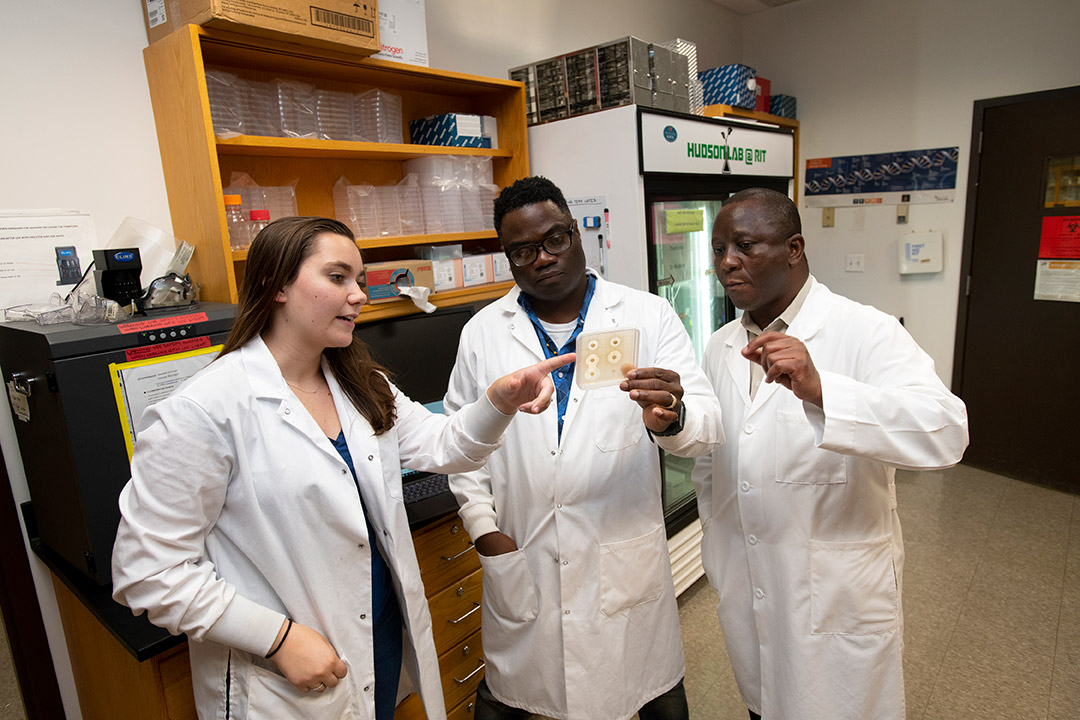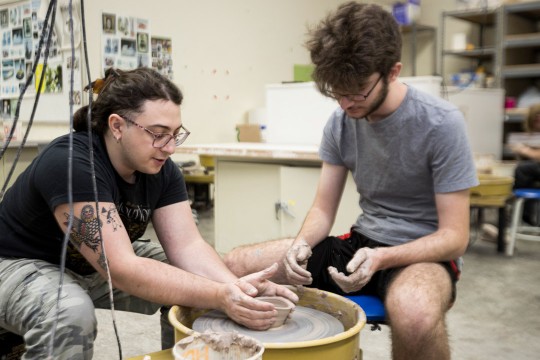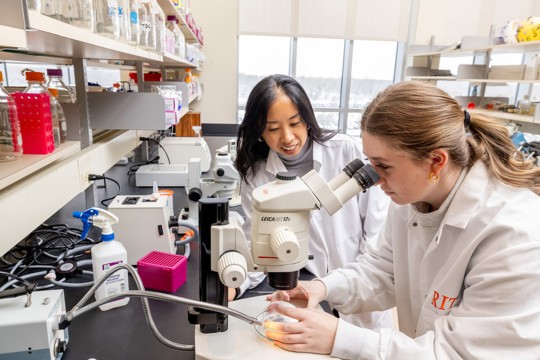Student researcher focuses on bacteria in Lake Ontario
A. Sue Weisler
Marissa Schroeter worked with her mentors, RIT professors Andre Hudson, center, and Bolaji Thomas, right, to study bacteria from Lake Ontario.
Marissa Schroeter’s summer undergraduate research explores a global health issue with a local twist. Her work prospects for new antibiotic compounds produced by two bacterial strains collected from Lake Ontario.
Schroeter, a fourth-year student from Canton, Conn., majors in biotechnology and molecular bioscience in the College of Science and biomedical sciences in the College of Health Sciences and Technology. As a student in both colleges, Schroeter benefits from the dual mentorship of André Hudson, head of the Thomas H. Gosnell School of Life Sciences, and Bolaji Thomas, professor of biomedical sciences. She is also a member of their respective labs, as well as the incoming president of the RIT Biotech Club. The College of Health Sciences and Technology supported Schroeter’s research. She will present her findings at the RIT Undergraduate Research Symposium.
Read more
RIT will showcase a variety of research projects undertaken by students and faculty-mentors over the 2020-21 academic year during the annual Undergraduate Research Symposium, held virtually July 29 through Aug. 4. Read more about the symposium.
Bacteria have adapted to the overuse of antibiotics in health care and in agriculture and are becoming resistant to antibiotic medicine. Scientists are working to compensate for a lag in pharmaceutical research and are developing new antibiotic alternatives.
The bacteria Schroeter used in her study came from a water sample she had collected years ago on a whim. “I had just moved to the area, and I hadn’t seen the lake yet, and I wondered if there’s anything fun in there that will produce anything,” she said. “I got a water sample, and that’s where things started.”
After isolating the bacteria, Schroeter moved on to other projects in the Hudson Lab. The bacteria sat in the lab’s freezer until this past spring. “I thought, ‘I have these two species that I never did anything with, but I know they do something and form a biofilm together, let’s use them,’” she said.
Bacteria grow in colonies on slimy substrates called biofilms. (Think plaque, for example.) Schroeter wondered if the two strains—one of which is uncommon—would grow together and exchange genetic information. This process of sharing plasmids is a bacterial survival tactic that assists bacteria in sharing antibiotic resistant genes. Schroeter hoped her bacteria would produce this effect.
“I learned a lot of my hands-on lab skills from Dr. Hudson and from working in his lab,” Schroeter said.
“It’s a really great experience because he’s always in the lab and asking, ‘What are you doing today, and do you have any questions?’ And Dr. Thomas has given me a unique perspective on where my career is headed. He always challenges me to think of where I am going to be in the future rather than where I am right now. He is really great at helping me move myself forward.”
Schroeter values her mentors’ input and professional advice as she applies to doctorate and medical/doctorate programs. Her goal is to become a medical science researcher.
“Science takes longer than you planned for,” Schroeter said. “That is something I’ve learned this summer. If something can go wrong, it will, and you just have to learn from it and try again. Science is a career of persistence.”







